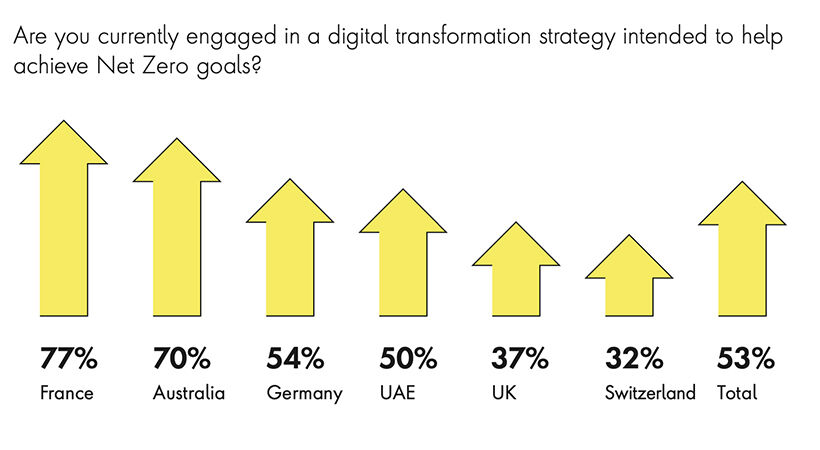A survey of top technology leaders at energy firms across the UK, EU, the UAE and Australia reveals a clear commitment among digital energy leaders to use digital business transformation to reduce carbon emissions, with 8.2 out of ten saying Net Zero was their top priority and 86% saying that digital transformation would play a key role in achieving their company’s Net Zero ambitions.
Investment in digital business transformation will be a key feature in the ‘post COP26’ era, as businesses play their part in achieving global Net Zero emissions by 2050.
Key Findings of the "Next Stop Net Zero" report by Publicis Sapient include:
France and Australia lead the way in digital transformation – UK and Switzerland lag behind.
When asked if they were currently engaged in a digital transformation strategy intended to help achieve Net Zero goals, leaders in France were most likely to indicate that change was currently underway:
- 77% - France
- 70% Australia
- 54% Germany
- 50% UAE
- 37% UK
- 32% Switzerland
Government regulation is working to pressurise change companies to change - customers, shareholders and employees also play strong role;
- 80% of digital leaders surveyed agreed that a challenge to their business had been “Increased pressure via government regulation to become more environmentally sustainable”
- 74% cited increased pressure from customers
- 63% pointed to pressure from shareholders to become more environmentally sustainable
- 62% pointed to pressure from employees
- A lack of buy-in from the top - Lack of confidence in return on investment and lack of expertise in are also barriers to change:
- A lack of clear leadership emerged as a barrier to energy suppliers when looking to digitally transform to achieve Net Zero goals. Almost half (45%) of respondents cite insufficient management buy-in as a barrier to employing new strategies.
Responses to the question what are the main barriers, if any, for digital business transformation?
- 68% - Lack of in-house knowledge to implement, operate and/or maintain new technologies
- 68% - Lack of confidence or understanding regarding ROI
- 45% - Insufficient management buy in
- 41% - Lack of available funds/cost
- 40% - Unsure where to start
- 38% - Organisational culture


